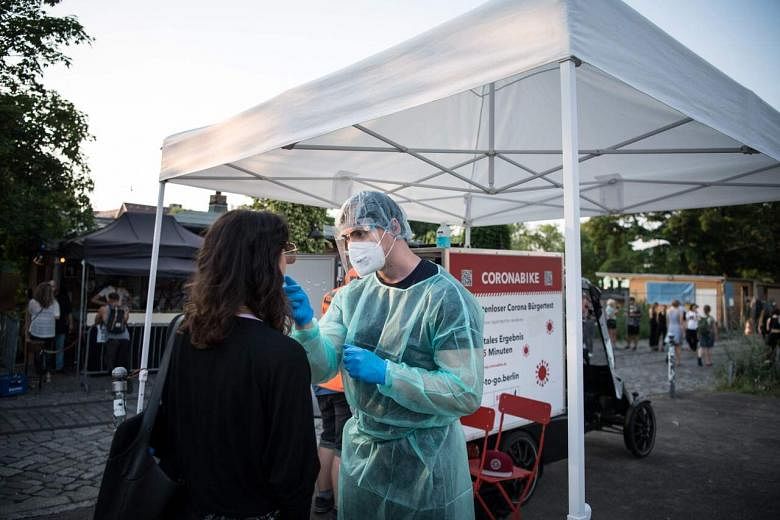BERLIN (REUTERS, AFP) - German Chancellor Angela Merkel's chief of staff fears that the number of new coronavirus cases will soar in the next few weeks and could hit 100,000 a day by the end of September, causing big problems for many businesses.
After more than two months of steady decline, cases have been rising in Europe's biggest economy since early this month, due mainly to the spread of the more infectious Delta variant.
Dr Merkel's Chief of Staff Helge Braun told Bild am Sonntag that cases were increasing by 60 per cent per week, even though nearly half the population has been fully vaccinated.
"If the Delta variant were to continue to spread at this rate and we don't counter it with a very high vaccination rate or change in behaviour, we would have an incidence of 850 (per 100,000 people) in just nine weeks," he said.
"That would equate to 100,000 new infections a day," he said, adding that the effect would be huge as so many people would have to quarantine.
"The impact on work processes in factories would be massive. We are already seeing this in the UK," Mr Braun added.
The number of cases has risen by 1,387 in the last day to 3.76 million, the Robert Koch Institute for infectious diseases said on Sunday (July 25), with the seven-day incidence inching up to 13.8 per 100,000 people.
Mr Braun urged Germans to get vaccinated. Around 60 per cent of Germany's 83 million people have had a first shot and about 48 per cent are fully vaccinated.
While Germany has made clear it will not force people to get vaccinated, Mr Braun said those who refused would have to face some restrictions.
"Vaccinated people will definitely have more freedom than unvaccinated people," he said.
Currently, Germans can use facilities such as restaurants, cinemas and sports venues if they are either fully vaccinated or able to provide a recent negative test.
But if infection rates continue to rise, unvaccinated people will have to reduce their contacts, Braun said.
"That could mean that visiting places like restaurants, cinemas and stadiums would no longer be possible even for tested unvaccinated people because the risk is too high," he said.
The country has a duty to protect people's health, Mr Braun said. "This includes a health service that does not have to postpone cancer and joint operations again in winter to treat Covid-19 patients."
Health Minister Jens Spahn said early this month that people who are vaccinated will not have to go into full lockdown again and will enjoy more freedoms than unvaccinated people in case of another virus resurgence.
"As long as there are no mutations that impact the protection from vaccines... then being fully vaccinated means that restrictions of the kind we saw last winter will not be necessary, needed or legally appropriate," he said.
Some 91,524 people have died of Covid-19 related causes in Germany.











